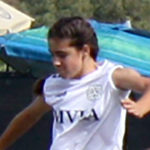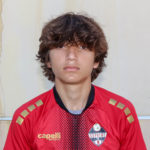Soccerwire Q&A: Lower Merion SC Lightning coach Paulo Ferreira at Jefferson Cup
By Jimmy LaRoue
MIDLOTHIAN, Va. — Paulo Ferreira seeks to have his Lower Merion SC Lightning team play jogo bonito – the beautiful game.
Between the coaching staff and his team, 12 nationalities are represented among their backgrounds, and Ferreira, who hails originally from Portugal and has spent time in Brazil, has everyone embrace their heritage in the way they play.
Soccerwire.com had a chance to catch up with him after his team’s first match Friday at River City Sportsplex, in which Lower Merion won 3-0 over Carolina Elite Soccer Association 96 Premier. Ferreira talked about how he encourages that international flair, and more:
Soccerwire.com: What did you think about how your team played, given the windy weather conditions?
Paulo Ferreira: First of all, I’m glad that we got these games in. At the beginning, I thought that the weather was going to impact this tournament. I’ve been here before. I think it’s a great tournament and we played a National League team. We played them before and knew that they had a lot of values. I was glad that we were playing in a great facility and the boys actually played at that level. That’s the most important thing.
SW: What were you looking for out of your team in the opening game?
PF: Actually, we were looking for a shutout. We came from a tournament in which we gave up some goals and started with a 3-0 game and getting the maximum points of 10 points. It was our goal to have a good shutout and have some goal opportunities. We created more than 20 shots on goal, so that’s exactly what we were looking for.
SW: When you’re at your peak, what are you doing to have your team create those opportunities?
PF: Well, me being from Europe, we always emphasize good passing and playing feet, and the opportunities will generate themselves…The most important thing is the belief in each other, and not just kicking the ball, playing feet and the opportunities will present themselves.
SW: Why did you call over Rushard Larmond and embrace him after his first half goal?
PF: He was on a 19-game scoring drought, and I told him today was the day. He respected that, and he did it, so it was good.
SW: What are you looking to accomplish through the Jefferson Cup?
PF: [Saturday], we’re going to play Cincinnati Crew Gold. They’re a very great team. Just hopefully go out there and have these boys play the best that they can so they can showcase themselves to the college coaches, and if we can get out of here – not only about winning but about playing great soccer.
SW: How is your team different than that of a top-level Development Academy team?
PF: I let my players loose. I was born in Portugal. I was raised in Brazil. I’m big on my kids’ philosophy and psychological game. I think academies, they take away [players’ flair]. If I have a kid from Liberia, I let the kid play his own style. I have kids from Jamaica. I let them play their own style. Tactically, I just keep them my way, but as far as technically, I don’t like to take their cultures away from them. And that’s the difference with the academies. The middle-third part of the game, the offensive third part of the game, I kind of let them bring out their cultures.
SW: So within your own framework, you allow them their own creativity?
PF: Well, the reason why is in the summer I go to Europe for a month, and I go to Brazil for two months, and I take a lot of courses and I see the way the teams play there. The individual, the technical abilities are high, and I feel that’s the biggest thing that’s missing in United States soccer. We can defend like Germany and Italy. We have the best goalkeepers in the world. We have good defensive [midfielders], but we’re missing the [Andres] Iniestas, the [Lionel] Messis, the Cristiano Ronaldos, and I think that this is the generation. All my kids play futsal in the winter. I try to teach them 1v1, and movement on the field, and that’s what creates beautiful soccer.
SW: How much does that help them having played futsal?
PF: It helps the speed of thinking. All my players have three to four choices when they step out on the field. We call it the ABC’s – first, touching the ball, space and then passing and movement. Futsal brings that to the game. Moving around, always looking for space. Don’t let the game come to you. You go to the game. They see the field in squares. We divide the field into nine squares. That’s how we do it.
SW: Do you see other youth players and teams adopting a philosophy of allowing players to apply their own flair to the game?
PF: I see it at the club level. At the academy level, I don’t see it because coaches are too strict and they want to play correct. But the correct way is never the best at times. I know players that left my clubs three or four years ago and went to an academy, and I see them now, I’m surprised that they’re limited, they’re limited to two, three things, rather than limited to a lot of things.
SW: The ones you’re coaching, you allow to do those things?
PF: Yeah, because we’re a club, not an academy. However, I own an academy of futsal (American Futsal Academy in King of Prussia, Penn.), and all my players play futsal academy. … I told my parents, ‘It’s not about winning, but about playing jogo bonito, or beautiful soccer.’
SW: How many different countries are represented on your team?
PF: Nine…My coaching staff – my goalkeeping coach [Thom Schauerman] is from Germany. My assistant coach [Lee Kouadio-Tobey] is from Ivory Coast, same country as [Didier] Drogba. I’m from Portugal myself. Along with us [coaches], it’s 12 different countries.
SW: How did they all get to your team?
PF Well, it helps that I speak five languages, so a lot of these players, it helps that when they come from their countries. I watch them in school, and if they have what it takes, if I see they’re tactically disciplined and individually technically advanced, then I can say, he needs to learn the tactical game. But you know, it’s easier to teach a good individual player, a good 1v1 player the tactical aspect of the game because he already is ahead of the game. It’s really hard to teach a tactical player who doesn’t want the 1v1, the technical ability. It’s very hard to teach him to be that player. You can’t teach Messi to be Messi, but you can teach Messi to be a good defensive player because he already has the other skills.











